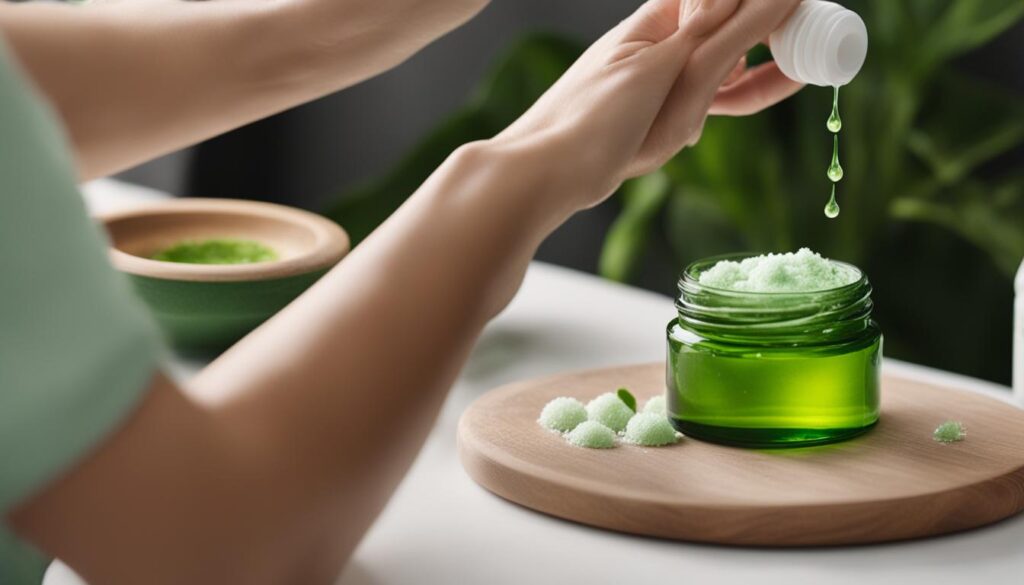Table of Contents
Dealing with chickenpox can be uncomfortable and frustrating. The itchy blisters and discomfort can make you feel miserable. While there is no cure for chickenpox, essential oils can offer natural relief and help alleviate symptoms. In this article, we will explore how essential oils can provide a soothing effect on your skin and promote healing.
Key Takeaways:
- Essential oils can provide natural relief for chickenpox symptoms and promote skin healing.
- Tea tree oil, lavender oil, and eucalyptus oil are beneficial for soothing chickenpox symptoms.
- Helichrysum oil, frankincense oil, and Roman chamomile oil are helpful for skin healing.
- Proper usage and safety precautions should be followed when using essential oils.
- Other natural remedies, such as oatmeal baths and calamine lotion, can also provide relief.
1 What Are Essential Oils?
Essential oils are concentrated plant extracts known for their aromatic and therapeutic properties. They are obtained through various methods such as steam distillation or cold pressing. Essential oils have been used for centuries in traditional medicine practices for their potential health benefits. They can be a natural alternative to conventional treatments.
These oils are derived from different parts of the plant, including the leaves, flowers, bark, and roots. They retain the natural compounds and essences of the plant, which are responsible for their distinctive aromas and healing properties.
Essential oils are highly regarded for their efficacy in promoting holistic wellness. They offer a wide range of potential benefits for both physical and emotional well-being. From relieving stress and promoting relaxation to supporting immune function and aiding in skin health, essential oils have a diverse range of applications.
Due to their natural origins and versatile properties, essential oils are commonly used in various forms of natural remedies. Many people incorporate them into their daily wellness routines, whether through topical application, inhalation, or aromatherapy practices.
“Essential oils have been used for centuries in traditional medicine practices for their potential health benefits.”
Additionally, essential oils are often found in skincare products, body oils, and massage oils, further showcasing their popularity as natural remedies.
Image:
2 Essential Oils for Chickenpox Symptoms
If you’re looking for natural remedies to alleviate chickenpox symptoms, essential oils can be a beneficial option. These oils have properties that can help reduce itching and inflammation, providing much-needed relief. Here are a few essential oils that you can try:
- Tea tree oil: Known for its antibacterial and antiviral properties, tea tree oil may help reduce itching and inflammation caused by chickenpox.
- Lavender oil: With its calming effects, lavender oil can promote relaxation and alleviate discomfort associated with chickenpox.
- Eucalyptus oil: This oil has anti-inflammatory properties that can help soothe irritated skin and relieve inflammation.
To use these essential oils, you can apply them topically to the affected areas or incorporate them into a warm bath. The soothing properties of these oils can provide relief and assist in managing chickenpox symptoms.
It’s important to note that essential oils should always be diluted before applying to the skin. You can mix a few drops of the essential oil with a carrier oil, such as coconut oil or almond oil, to ensure safe usage. Conduct a patch test on a small area of skin to check for any potential allergic reactions before using essential oils extensively.
Remember, essential oils should be used as a complementary treatment and should not replace medical advice. If you have any concerns or underlying health conditions, consult with a healthcare professional before incorporating essential oils into your chickenpox care routine.
3 Essential Oils for Skin Healing

When it comes to promoting skin healing, essential oils can be a valuable natural remedy. These oils possess unique properties that accelerate wound healing, reduce the appearance of scars, and provide soothing relief for irritated skin.
Helichrysum oil is rich in antioxidants and has powerful anti-inflammatory effects. This oil shows potential in accelerating wound healing and minimizing scar formation. Applying helichrysum oil directly to the affected areas or diluting it with a carrier oil can help expedite the healing process and improve the overall appearance of scars.
Frankincense oil, known for its rejuvenating properties, stimulates the production of skin cells. By promoting cell regeneration, frankincense oil aids in the healing of wounds and encourages faster recovery. Applying frankincense oil topically can support the natural healing process and enhance the skin’s texture and tone.
Roman chamomile oil boasts soothing properties that can reduce redness and irritation in the skin. This oil is gentle and calming, making it an excellent choice for sensitive or inflamed skin. Applying roman chamomile oil to the affected areas can provide relief from discomfort and promote a faster healing process.
These essential oils can be used individually or in combination, depending on your specific needs. It’s important to remember that essential oils are highly concentrated and should be used with caution. Dilute them with a carrier oil before application to avoid any potential skin irritation or adverse reactions. If you have any concerns or sensitive skin, it’s advisable to consult with a healthcare professional before incorporating essential oils into your healing routine.
4 Safety Precautions and Proper Usage
When using essential oils, it’s crucial to prioritize safety and proper usage. By following these guidelines, you can enjoy the benefits of essential oils while minimizing potential risks:
Dilution Guidelines: Always dilute essential oils with a carrier oil before applying them to your skin. This helps to prevent irritation or sensitivity reactions. A general rule of thumb is to use a 2-5% dilution ratio, which means adding 12-30 drops of essential oil to 1 ounce of carrier oil. For individuals with sensitive skin, a lower dilution (1%) may be more appropriate.
Conduct a Patch Test: Before applying any essential oil to a larger area of your skin, it’s essential to conduct a patch test on a small area first. Apply a diluted mixture of the essential oil and carrier oil to your inner wrist or the crook of your elbow. Wait for 24 hours and observe for any redness, itching, or irritation. If no adverse reactions occur, it is generally safe to use the oil as directed.
Avoid Sensitive Areas: Take caution when applying essential oils around sensitive areas such as the eyes, mouth, or genital area. Essential oils can be irritants and may cause discomfort or allergic reactions in these areas. If accidental contact occurs, rinse thoroughly with water and seek medical attention if necessary.
Consult with a Healthcare Professional: If you have any underlying health conditions, or if you are pregnant or breastfeeding, it is advisable to consult with a healthcare professional before using essential oils. They can provide personalized guidance and ensure that the chosen essential oils are safe for your specific situation.
Remember, while essential oils can offer numerous benefits, it is essential to use them responsibly and with caution. By following these safety precautions and adhering to proper usage guidelines, you can enjoy the therapeutic properties of essential oils without compromising your well-being.
5 Other Natural Remedies for Chickenpox

In addition to essential oils, there are other natural remedies that can provide relief for chickenpox. Here are some effective home remedies that can help alleviate symptoms and promote healing:
- Oatmeal baths: Soothe itchy skin by adding colloidal oatmeal to warm bathwater. The anti-inflammatory properties of oatmeal can provide relief from irritation.
- Baking soda baths: Help dry out the blisters by adding baking soda to warm bathwater. Baking soda can neutralize the pH of the skin and promote healing.
- Calamine lotion: Alleviate itching and discomfort by applying calamine lotion to the affected areas. It forms a soothing barrier on the skin and helps dry out the blisters.
It’s important to keep the affected areas clean to prevent infection. Avoid scratching the blisters, as it can lead to scarring and prolong the healing process. Remember to wash your hands frequently and maintain good hygiene. These natural remedies, combined with essential oils, can provide a holistic approach to chickenpox treatment and promote a quicker recovery.
| Home Remedies for Chickenpox | Benefits |
|---|---|
| Oatmeal baths | Soothe itchy skin; provide relief from irritation |
| Baking soda baths | Aid in drying out blisters; promote healing |
| Calamine lotion | Alleviate itching and discomfort; dry out blisters |
6 When to Seek Medical Attention
While most cases of chickenpox resolve on their own, there are instances when medical attention may be necessary. It’s important to be aware of the signs that indicate the need for a doctor’s evaluation. If you notice any of the following symptoms, it is recommended to see a doctor:
- Signs of infection, such as pus or redness around the blisters
- High fever
- Severe headache
- Difficulty breathing
These symptoms may indicate complications related to chickenpox, such as pneumonia or meningitis. Seeking immediate medical attention in such cases is crucial for proper diagnosis and appropriate treatment.
Being aware of the potential complications and knowing when to see a doctor can help ensure timely intervention and a swift recovery from chickenpox.
7 Conclusion
When it comes to finding natural relief for chickenpox, essential oils offer a soothing and effective option. These oils can help alleviate symptoms and promote skin healing, making them a valuable addition to your chickenpox treatment options.
By incorporating essential oils into your regimen and combining them with other natural remedies, you can experience relief from discomfort and support your body’s healing process. However, it is important to use essential oils safely and consult with a healthcare professional if you have any concerns or underlying health conditions.
Remember, with proper care and treatment, you can find the natural relief you need for chickenpox and provide your body with the support it deserves during this time of discomfort. Explore the benefits of essential oils and discover how they can contribute to your overall well-being.
FAQ
Are essential oils effective for treating chickenpox?
While essential oils cannot cure chickenpox, they can provide natural relief and help alleviate symptoms.
Which essential oils can help relieve chickenpox symptoms?
Tea tree oil, lavender oil, and eucalyptus oil are known to have properties that may reduce itching, inflammation, and soothe irritated skin.
How do essential oils promote skin healing?
Essential oils like helichrysum oil, frankincense oil, and Roman chamomile oil have antioxidant, anti-inflammatory, and soothing properties that may accelerate wound healing and reduce the appearance of scars.
How should I use essential oils safely?
Essential oils should always be diluted with a carrier oil before applying to the skin. Conduct a patch test before use and avoid sensitive areas like the eyes and mouth. Consult with a healthcare professional if you have underlying health conditions or are pregnant or breastfeeding.
Are there other natural remedies for chickenpox?
Yes, oatmeal baths, baking soda baths, and calamine lotion can provide relief for itching and discomfort. Keeping the affected areas clean and avoiding scratching can also promote healing.
When should I seek medical attention for chickenpox?
If you notice signs of infection, such as pus or redness around the blisters, high fever, severe headache, or difficulty breathing, or if complications like pneumonia or meningitis develop, immediate medical attention is crucial.
Can essential oils be used in conjunction with other natural remedies?
Yes, essential oils can be used alongside other natural remedies to alleviate discomfort and support the recovery process. Consult with a healthcare professional for specific guidance.
Do essential oils provide a cure for chickenpox?
No, there is no cure for chickenpox. However, essential oils can provide natural relief and promote the healing process.
We may earn a commission for purchases made using our links. Please see our disclosure to learn more. We appreciate your support SO very much.











